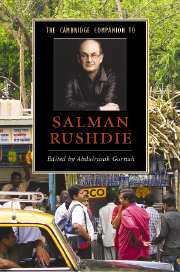Book contents
- Frontmatter
- 1 Introduction
- Part I: Themes and Issues
- Part II: Studies of Individual Texts
- 6 Tricksters and the common herd in Salman Rushdie’s Grimus
- 7 Themes and structures in Midnight’s Children
- 8 Reading ‘Pakistan’ in Salman Rushdie’s Shame
- 9 The Satanic Verses: ‘To be born again, first you have to die’
- 10 The shorter fiction
- 11 The politics of the palimpsest in The Moor’s Last Sigh
- 12 The Ground Beneath Her Feet and Fury: The reinvention of location
- Guide to further reading
- Index
- Series List
9 - The Satanic Verses: ‘To be born again, first you have to die’
from Part II: - Studies of Individual Texts
Published online by Cambridge University Press: 28 November 2007
- Frontmatter
- 1 Introduction
- Part I: Themes and Issues
- Part II: Studies of Individual Texts
- 6 Tricksters and the common herd in Salman Rushdie’s Grimus
- 7 Themes and structures in Midnight’s Children
- 8 Reading ‘Pakistan’ in Salman Rushdie’s Shame
- 9 The Satanic Verses: ‘To be born again, first you have to die’
- 10 The shorter fiction
- 11 The politics of the palimpsest in The Moor’s Last Sigh
- 12 The Ground Beneath Her Feet and Fury: The reinvention of location
- Guide to further reading
- Index
- Series List
Summary
The publication of Salman Rushdie's fourth novel The Satanic Verses in September 1988 released an unforeseen process of reaction and protest against and for the novel and its author. The protests against the book concentrated on the issue of alleged blasphemy against Islam while those defending it argued for freedom of expression. The protest culminated in the fatwa, or a legal statement, by Ayatollah Khomeini on Rushdie, condemning him to death for intentionally opposing Islam:
I inform all zealous Muslims of the world that the author of the book entitled The Satanic Verses - which has been compiled, printed, and published in opposition to Islam, the Prophet, and the Qur'an - and all those involved in its publication who were aware of its contents, are sentenced to death.
Consequently, Rushdie was forced to live in hiding for fear of assassination. In the process, the novel itself attained the status of being talked about while it remained notoriously unread. The novel will be discussed here as a text: first its structure, characterisation and stylistic features, then the wide range of themes it discusses and its intertextual reaches. The discussion will close by considering the ethical issues Rushdie's novel raises.
Despite its often misrepresented reputation, The Satanic Verses is a complex, ambitious and rewarding novel which explores questions of identity and belonging. The novel's two main characters, Gibreel Farishta and Saladin Chamcha, are travelling in a jumbo jet which is blown up by terrorists over the English Channel. When they begin their fall - literally and metaphorically - they go through a process of transformation in which they become adversaries.
- Type
- Chapter
- Information
- The Cambridge Companion to Salman Rushdie , pp. 125 - 138Publisher: Cambridge University PressPrint publication year: 2007
- 1
- Cited by

